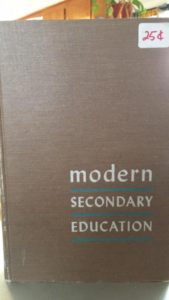I could not resist purchasing this (rewritten Third Edition addressing the dramatic changes in education since 1950) in no small part because I was laughing so hard at UAA Instructors advising students not to use Wikipedia in composing answers to short answer/identification questions on take home finals (as if they were going to find usable answers in the horrendous texts employed, or the equally useless lecture notes afforded to the students  ). The book was waiting for me on the UAA Consortium Library cast-offs cart for the stated price of $.25 and, as I said, I could not (would not) resist.
). The book was waiting for me on the UAA Consortium Library cast-offs cart for the stated price of $.25 and, as I said, I could not (would not) resist.
From quoting Commager, “No other people ever demanded so much of education as have the American. None other was ever served so well by its schools and educators” (93), the book moves to more realistic appraisals of the issues education in the U.S. face.
No agency but the school can provide the systemic, disciplined intellectual training required. This is, and always has been, the primary, indispensable funtion of the school. The nation is betrayed if the school shirks this responsbility or subordinates it to any other aim, however worthy in itself. The school exists to provide intellectual training, in every field of activity where systematic thinking is an important component of success * * * [but] [a]n increasing number of public schools administrators and educational theorists today refuse to define the purposes of the school in terms of intellectual training or of recognized disciplines of science and scholarship (103, misciting Bestor, the cite for which can be found below ).
And Bestor’s take? Well….
An inkling of what the educators mean ·when they propose to bring the great issues of public life down tb the level of what they call the “real-life problems of youth” is afforded by an elaborate report on The SchoolJ and National Security, which the Illinois Curriculum Program has recently published. The first task of the social studies, according to the d1apter devoted to them, is to “reduce the tensions and meet the needs of children and youth.” There are some starry-eyed promises about developing “a constructively critical attitude toward foreign policy” among pupils who, of. course, are not to be burdened with any useless knowledge of history or geography or foreign languages. And when the report gets down to specific classroom work, it solemnly suggests that the schools can serve the nation in its present, hour of peril by asking its students to “make studies of how the last war affected the dating pattern in our culture.”
But perhaps the best way to approach the book is its review in Educational Leadership via Lewis Carroll.
One who seeks definitive answers to educational problems may he disappointed in this book. One who seeks an organized departure point for thinking through many of the issues of secondary education will find this source very helpful. Unlike the discussion of curriculum in Alice in Wonderland, this text deals with Modern Secondary Education in a realistic, straightforward, practical manner. And, as the Gryphon said in a very decided tone to Alice, “That’s enough about lessons.”
Maybe we have something to learn from Alexander and Saylor?